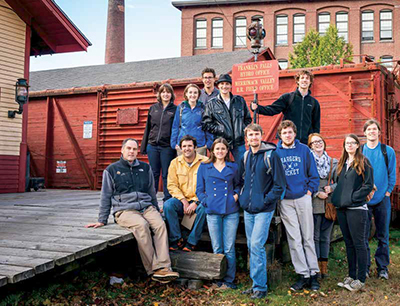
Breathing New Life Into an Old Mill Town
Each year, junior environmental studies and environmental science majors participate in a yearlong community-based research project. They are encouraged to think critically and creatively as they apply the knowledge they've gained in the classroom to a real-life situation: working with a local client on a project of environmental concern to evaluate how to increase sustainability and resilience. Previous student groups have created a sustainability action plan for Colby-Sawyer and performed lake assessments, developed natural resource inventories and analyzed food systems on behalf of clients such as the New London Conservation Commission and Pleasant Lake Protective Association.
This year, 10 other students and I worked to create a vision for the downtown area of Franklin, N.H., 20 miles east of Colby-Sawyer and the state's smallest city, with about 8,500 residents. We looked for innovative ways to reestablish a vibrant and sustainable downtown area that would appeal to all ages.
Set along the Winnipesaukee River where it merges with the Pemigewasset to form the headwaters of the Merrimack, Franklin was incorporated in 1825 and enjoyed a heyday from1850 to 1900 with mills like the Aiken Hosiery Mill, Franklin Needle Company, and textile and other factories—it was a hub of industry and commerce, with a lively downtown complete with an opera house. As industry dwindled, however, so did Franklin's fortune. The last mill closed in 1970, and now the economically depressed city needs transformation.
Led by Jennifer White '90, director of sustainability, and Assistant Professor of Environmental Studies Harvey Pine, our class collaborated with Todd Workman of the Franklin Falls Downtown Development Authority (DDA). The city is due to update its master plan this year, and our class did extensive research on Franklin's current systems of waste management, energy, transportation and storm-water management. We offered suggestions for the plan and continue to envision ways in which those four areas can be improved environmentally, economically and socially.
Franklin already has some attractive features. For example, the three rivers provide the town with natural beauty as well as recreational opportunities, and it already has several attractions such as Odell Park and the Winnipesaukee Rail Trail bike path. We're looking to expand on this already promising base. We also want to encourage environmentally sustainable practices and ways to grow employment opportunities.
“Our goals and initiatives are very much in line with the … platform embodied [by] Colby-Sawyer,” said Workman, referring to the college's dedication to sustainable practices. “The perspective of the educated youth who represent the millennial demographic has opened our eyes to some shortcomings in our master plan.”
Our class met with the city manager and various departments and organizations in Franklin to gain information and ask questions about the city. We spent every Monday in Franklin, where we saw firsthand the DDA's working canvas and what it would like to achieve. We learned how to work in a professional setting with a client and gained proficiency in writing grants and proposals. Dan Keane '16 said that the project “is truly a unique class, and for students to get involved with a real-world issue is a great learning opportunity.” With the vibrant and attainable goals set before them, our class is optimistic about turning our vision for a revitalized Franklin into a reality.
- Carrie Brewster '16
Carrie Brewster is an environmental science major and English minor from Boscawen, N.H. She is a member of the national honor society Alpha Chi and competes on the track and field team as well as the cross country team.
About Colby-Sawyer College
Colby-Sawyer College is a comprehensive college that integrates the liberal arts and sciences with professional preparation. The College's faculty, staff and students strive for excellence in an engaged teaching and learning community that fosters students' academic, intellectual, and personal growth. With a strong emphasis on learning outcomes, including breadth and depth of knowledge, self-growth, creative and critical thinking, and effective communication, Colby-Sawyer prepares students to thrive post-graduation and make a positive impact upon a dynamic, diverse, and interdependent world.
Founded in 1837, Colby-Sawyer is located in the scenic Lake Sunapee Region of central New Hampshire. Learn more about the College's vibrant teaching and learning community at www.colby-sawyer.edu.


